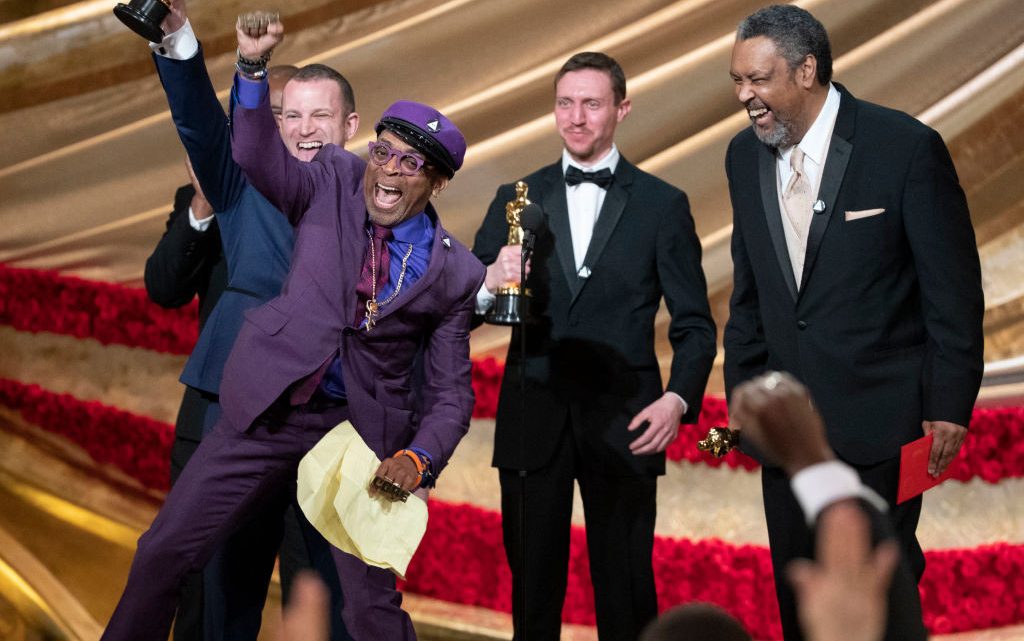
Spike Lee’s Oscar Speech Was A Lesson In Black History
February 25, 2019History was (finally) made tonight when the Academy Awards gave Spike Lee an Oscar for Best Adapted Screenplay for BlacKKKlansman, his first Oscar ever. Spike, draped in a purple homage to Prince and sporting Radio Raheem’s LOVE and HATE knuckle rings, approached the stage with joy and jumped into the arms of presenter and frequent collaborator Samuel L. Jackson, who barely concealed his disappointment at Green Book winning Best Original Screenplay minutes earlier.
After telling the producers to “not start that motherfucking clock,” Lee produced a legal pad on which he read his acceptance speech. It was a touching few minutes of honoring black history and naming the ancestors who made his presence on that stage possible—from the “slaves who worked from can’t see in the morning til can’t see at night,” to his Spelman alum grandmother (she the daughter of an enslaved woman) who helped put him through undergrad at Morehouse and NYU film school. He also thanked his family, children, and even acknowledged the indigenous tribes whose stolen land we sit on and who were murdered trying to protect it.
What Lee’s long overdue speech confirmed is that for African Americans to reach an ultimate stage like the Oscars, it truly takes a village. Lee received critical family support to go to college and finance his first feature film, She’s Gotta Have It. The film starred his sister Joie, who would go on to star in several of his other movies, and his father, jazz artist Bill Lee, who also scored the film and many other of his son’s works. In addition to the Prince shout out in his wardrobe—Prince scored Girl 6—Lee was wearing custom Jordans, but even that was significant, as Michael Jordan was a financial contributor to his 1992 Oscar-nominated film Malcolm X.
Would we have ever known the works of Shelton Spike Lee if his village had not nurtured his talent and also helped fund it? Hearing him thank his grandmother, I was reminded of my own grandmother, who also helped send me to college. I thought of my parents, who paid for writing classes and camps for me when I was young, and friends who have read my work, come to my readings, or watched my kids so that I could write. When the institutions of power and privilege have been closed to people who look like you, it takes all of those people in your village pushing you, keeping you on your feet, believing in you even when you lose, and gathering around you to keep you level when you win. Any person of color who has been “the first” in a historically segregated space or to receive recognition by their professional peers understands the critical importance of the village and how many people are responsible for their success.
Lee has also been generous to other African Americans in his network in front of and behind the camera: casting Jackson over and over; hiring Ruth E. Carter for Do the Right Thing and Malcolm X (she thanked Lee in her speech when she won for Best Costume Design for Black Panther). His star actor (Denzel Washington)’s son, John-David Washington was the lead in BlacKKKlansman, opening up the door to a new generation of younger black actors in Hollywood for whom he might be able to write and direct new vehicles.
While Lee has gladly taken the role of Hollywood provocateur, his tone was mellow and that focused on love and unity. He encouraged the crowd to “do the right thing” during the 2020 elections and “be on the right side of history.” But he told them to do so with the full context and understanding of our history and each other’s humanity. Spike is still part of the village, and he wants to bring it together.
Sign up for our newsletter to get the best of VICE delivered to your inbox daily.
Follow Stacie Williams on Twitter.


